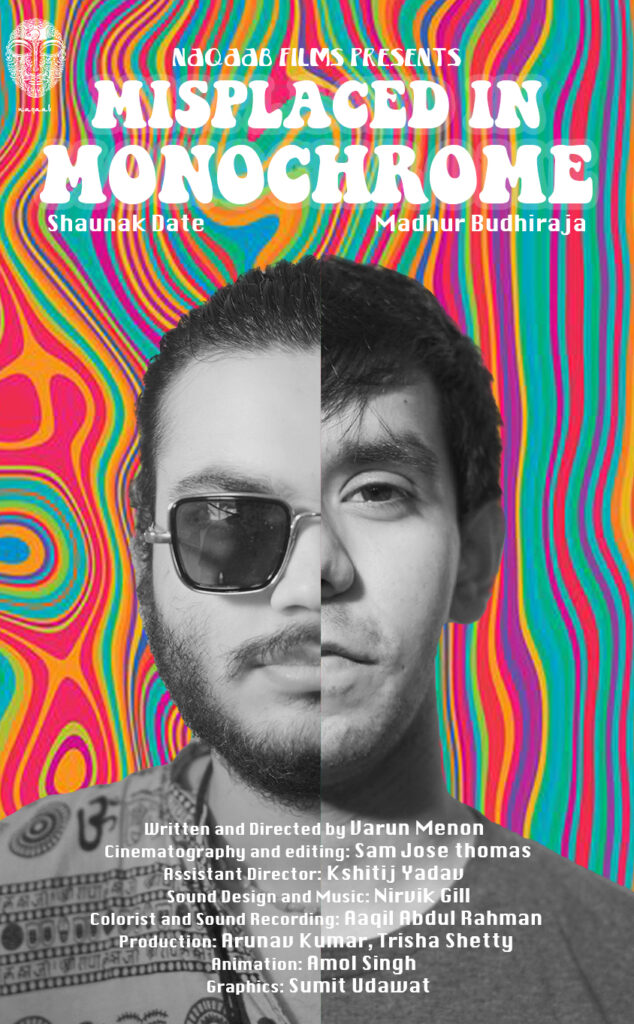
We all have our fears, be it an inexplicable fright of insects or fear at the aspect of an uncertain future. “Misplaced in Monochrome” is a beautifully portrayed concept that reassures the audience that it is okay to have fears in life. It centers around the core concept that some assurance can always help overcome a difficult situation.
A young boy afraid of his sexuality feels like an outcast (Misplaced) in a stereotypical society (Monochrome). He is looking for peace and a place where his mind can remain indifferent to what the “society” says. The boy is afraid to explore and own his true sense of being. That’s when a hand reaches out to him—a hand to help and guide him through all the self-doubt and self-loathe. The hand listens to the problems and tries to console him to the best of its capabilities, which is a dire need in that situation.
The short film is highly relevant to today’s generation as it shows a realistic lifestyle and the humour is very conversational. It attempts to truly connect with the audience, which is compelled to empathise with the protagonist. The significance of the social commentary makes it worthwhile, and the twist—surprising.
It aims to make the audience aware of the challenges the LGBTQ+ community faces, both mentally and physically. Most of us haven’t been in their shoes, and many have treated their reality in jest. The writer aims to transform this outlook in an appealing fashion, which doesn’t come across as a lesson but an understanding that is open to the audience’s interpretation. The boy is no different than an ordinary adolescent—but faces problems many fail to understand.
In today’s generation, the dependence on society clouds our minds to the extent that we lose the journey of self. Naturally, an anomaly considered by society will eventually be considered an anomaly by any individual. Empathy and compassion, in such a case, are hard to practice. In a world where everyone has preconceived notions, very few are courageous enough to fight the mental battle and break free from the shackles of society.
The film elucidates this social message in a commendable manner. Misplaced in Monochrome introduces a character that not only listens to the protagonist but also gives him the necessary guidance. Set in a “mellow” atmosphere, the character connects with the adolescent to help him truly look through the situation in ways he understands best.
The dialogues in this film speak volumes. The pauses, gestures, comedic references, and smooth transitions to confront serious issues, all make the half-an-hour duration of the film worth it. Both characters readily work on solving the protagonist’s predicaments, while analysing the outcomes. The conversation seems natural, almost similar to two friends having a chat about life over drinks.
The performance of the actors brilliantly matches the tone of the film. They set a welcoming tone to the storyline, while maintaining the audience’s attention. Even though the film is based in a simple location, mainly involving a discussion between two people, it sustains the interest of the viewer. The conversation consists of engaging elements, and is beautifully delivered by the actors.
On a spiritual note, the story brings out an unconventional image of God. It portrays God as a guiding power that assists one to stay on the right path. Actions can only be controlled by the individual, but God ensures that one always feels safe in their surroundings. Hence, guidance, understanding, and sympathy are invariably required, either by ourselves or the ones around us––to feel supported and loved.
The direction suits the story, with a simple backdrop where the boy resides. We are shown glimpses of his memory so that we understand what he is going through. There is humour, consolation, comfort, and a sense of satisfaction in watching the short story. In the end, we all need some confidence that everything will be alright—and sometimes, just the belief (if not the experience) is enough to attain a peaceful state.
Written by Parva Mehrotra for MTTN
Edited by Avaneesh M for MTTN
Featured Image by Naqaab Films

Leave a Reply
You must be logged in to post a comment.